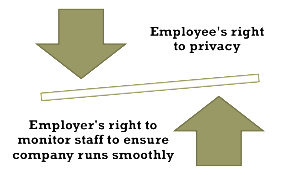European court changes its mind over right to privacy at work
We previously reported on the January 2016 ruling of the European Court of Human Rights (ECtHR) in which it was decided that employers can monitor personal messages of employees without breaching their right to privacy. The ECtHR has now had a change of heart and decided that its original decision was wrongly decided.
The facts
The employee in question, Mr Bărbulescu, was tasked with setting up an instant messaging account in Yahoo Messenger to allow the company to handle customer complaints. B regularly used the account to message his fiancée and brother. The company’s IT policy expressly forbade employees from using its IT systems for personal purposes. When B’s misuse of the instant messaging account came to light, he was dismissed. He disputed the fairness of the dismissal, arguing that the company had breached his right to privacy by accessing and making use of his personal messages. The case made its way through the local courts and eventually ended up in the ECtHR.
The appeal
Following the initial judgment of the ECtHR in January 2016, B appealed to the Grand Chamber of the ECtHR. His case was considered by 17 judges who overturned the earlier ruling. Their decision was based on a finding that the domestic courts had mishandled the hearing of B’s complaints and had therefore failed to protect his right to privacy.
The question for the ECtHR to decide was whether a fair balance had been struck between B’s right to respect for privacy and the employer’s right to monitor communications to ensure the smooth running of the company. The majority of the Grand Chamber decided that the domestic courts had (1) failed to establish the relevant facts and (2) failed to perform the requisite balancing exercise between B’s right to privacy and the employer’s interests.
In particular, the Grand Chamber noted that the domestic courts had failed to consider the following factors which were key to determining fairness:
- whether the employer notified the employee that monitoring of communications would take place;
- the extent of monitoring and the degree of intrusion into the employee’s privacy;
- whether there were legitimate reasons to justify monitoring and viewing content;
- whether less intrusive monitoring practices would have sufficed;
- the consequences of monitoring for employees and the use to which monitoring was put; and
- whether there were any safeguards for the employee.
The win was bittersweet for B as the ECtHR chose not to award him any compensation because it felt he had not suffered any monetary loss and the ruling that his right to privacy had been breached was sufficient reward for any non-monetary loss. The ECtHR permitted him to recover only part of his legal fees.
The case is of limited impact for the UK as we already have in place guidance on workplace monitoring for employers that largely reflects the Grand Chamber’s recommendations. Many of the principles in the Employment Practices Code, which was devised by the Information Commissioner’s Office, cover the same ground.
CASE Bărbulescu v Romania, European Court of Human Rights (Grand Chamber), 5 September 2017

